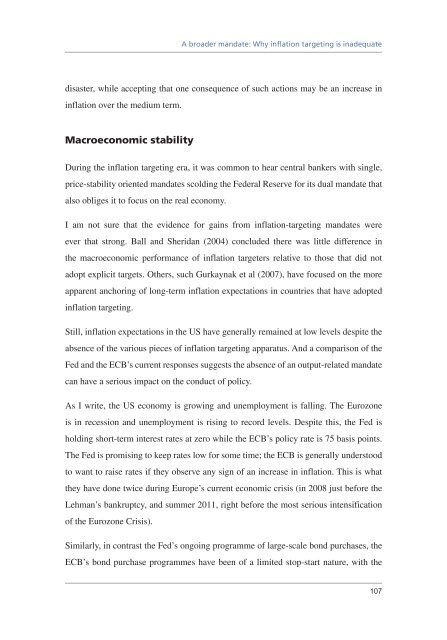Create successful ePaper yourself
Turn your PDF publications into a flip-book with our unique Google optimized e-Paper software.
A broader mandate: Why <strong>inflation</strong> <strong>targeting</strong> is inadequatedisaster, while accepting that one consequence of such actions may be an increase in<strong>inflation</strong> over the medium term.Macroeconomic stabilityDuring the <strong>inflation</strong> <strong>targeting</strong> era, it was common to hear central bankers with single,price-stability oriented mandates scolding the Federal Reserve for its dual mandate thatalso obliges it to focus on the real economy.I am not sure that the evidence for gains from <strong>inflation</strong>-<strong>targeting</strong> mandates wereever that strong. Ball and Sheridan (2004) concluded there was little difference inthe macroeconomic performance of <strong>inflation</strong> targeters relative to those that did notadopt explicit targets. Others, such Gurkaynak et al (2007), have focused on the moreapparent anchoring of long-term <strong>inflation</strong> expectations in countries that have adopted<strong>inflation</strong> <strong>targeting</strong>.Still, <strong>inflation</strong> expectations in the US have generally remained at low levels despite theabsence of the various pieces of <strong>inflation</strong> <strong>targeting</strong> apparatus. And a comparison of theFed and the ECB’s current responses suggests the absence of an output-related mandatecan have a serious impact on the conduct of policy.As I write, the US economy is growing and unemployment is falling. The Eurozoneis in recession and unemployment is rising to record levels. Despite this, the Fed isholding short-term interest rates at zero while the ECB’s policy rate is 75 basis points.The Fed is promising to keep rates low for some time; the ECB is generally understoodto want to raise rates if they observe any sign of an increase in <strong>inflation</strong>. This is whatthey have done twice during Europe’s current economic crisis (in 2008 just before theLehman’s bankruptcy, and summer 2011, right before the most serious intensificationof the Eurozone Crisis).Similarly, in contrast the Fed’s ongoing programme of large-scale bond purchases, theECB’s bond purchase programmes have been of a limited stop-start nature, with the107



